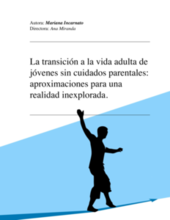Displaying 691 - 700 of 1482
This study sought to investigate the lived experiences of care leavers from institutional care facility in Botswana.
This study aimed to assess both the prevalence of stress and the coping mechanisms as well as identify the predictors of stress levels among adolescents in Malaysian orphanages.
This article reports the findings of a multi-country study of medical professionals' perceptions and evaluations of children in three Eastern European countries (Romania, Bulgaria, Moldova).
El trabajo se centra en el análisis de las trayectorias de un grupo de 199 adolescentes y jóvenes que viven o han vivido institucionalizados por una medida excepcional de cuidado, en siete provincias argentinas.
The Bucharest Early Intervention Project sought to examine the effects of foster care as an alternative to institutional care for abandoned infants in Romanian institutions.
In the current study the authors examined associations between children's pre-adoption experiences (type of pre-adoption care and early deprivation) and their adaptive and maladaptive behavioral adjustment.
This paper discusses findings from a small-scale qualitative study conducted in Harare, Zimbabwe. Findings show that young people aging out from Harare’s care institutions face challenges making their transition from care into adulthood.
This article reports on a systematic review of research on residential care-leaving in South Africa, from 2003 to 2016.
In this webinar, hosted by Rise Learning Network, Deep Savarni, Founder & Director of Praajak Development Society shares his experience in establishing the Child Protection Committees as a means to realize effective participation of children in monitoring care services in government-run child care institutions in India.
In order to define what support is necessary for the successful emancipation of young people leaving alternative care in Serbia, this study of 150 young people in care aims to analyse both their preparedness for leaving alternative care, and whether the type of placement (kinship, foster, or residential) makes a difference to the level of preparedness.

